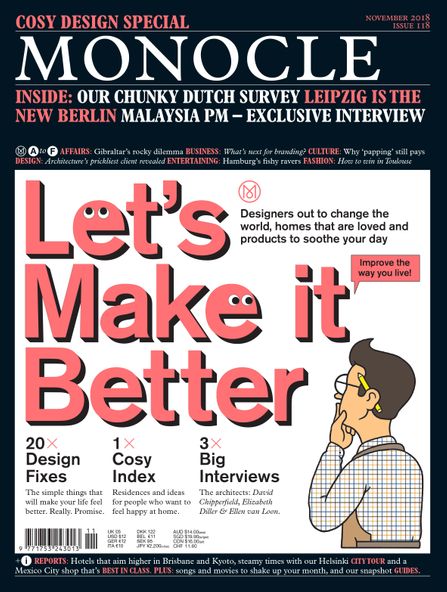 “Less strip lighting and bargain bins and more wooden shelves and lamps.”
“Less strip lighting and bargain bins and more wooden shelves and lamps.”
That statement from Monocle’s Tyler Brûlé cuts to the core of what he believes is wrong with the magazine industry today.
“Call it a cry from the heart or a call to action, Tyler Brûlé’s sensible and dare I say, spot-on advice should resonate with every magazine and book retail manager at any store, big or small, chain or indy,” writes Samir “Mr. Magazine” Husni in reviewing the November 2018 issue of Monocle.
“If more publishers and editors follow Tyler Brûlé’s approach, I am willing to bet that we will see a reverse in the trend of shrinking retail space for the many great magazines and books that are out there,” Husni continues.
Brûlé has long been a staunch critic of digital for digital’s sake, eschewing all social media for his highly successful luxury brand; this attitude has helped shape Monocle into a huge success. He’s become a poster child for making money in high-end print while so many around him went fast, cheap and easy, with some in the industry even calling him a “living media dinosaur.”
And he has some stark words for the rest of us in the industry – Cut the “digital transformation BS right now.”
“We’re in the business of selling print so let’s not dress it up as something else.”
To do this, we need to handle print as the luxury experience that it is, and stop assuming that people only want to read on screens. This fallacy has caused publishers to water down their print as they pivot to become cross-channel media brands.
“Sure,” he writes, “a mobile device is part of our daily news diet, but there is a drive to move our eyes back to paper.”
Brûlé believes that the print industry must work to improve the overall retail experience, in the same way, luxury retailers have redefined what it means to “shop.” Surprise the consumer with something worth reading, and give them a reason to visit those kiosks. Likewise, newsstand space operators – especially in airports and rail stations – play a part here.
“Airport and rail-station operators need to seize the cultural high ground and not pack concourses with Subways and Starbucks,” he writes. “Consumers need intellectual nourishment – give it to them. Demand more of tenants.”
We hear a lot of hand-wringing about the dumbing down of the average consumer, and our growing screen addiction. I appreciate the way Brûlé cuts right through that and offers some powerful antidotes. If media brands are addicted to growing a huge online audience, they’ll get what they are after… a multi-tasking goldfish of a reader. If a publisher seeks an engaged, upscale reader, they need to stop chasing digital metrics and get back to basics – in print.
